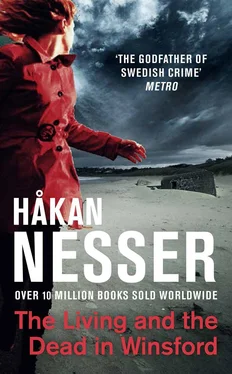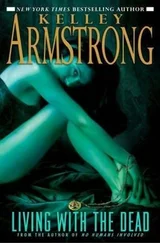Håkan Nesser - The Living and the Dead in Winsford
Здесь есть возможность читать онлайн «Håkan Nesser - The Living and the Dead in Winsford» весь текст электронной книги совершенно бесплатно (целиком полную версию без сокращений). В некоторых случаях можно слушать аудио, скачать через торрент в формате fb2 и присутствует краткое содержание. Год выпуска: 2013, Издательство: Mantle, Жанр: Криминальный детектив, на английском языке. Описание произведения, (предисловие) а так же отзывы посетителей доступны на портале библиотеки ЛибКат.
- Название:The Living and the Dead in Winsford
- Автор:
- Издательство:Mantle
- Жанр:
- Год:2013
- ISBN:нет данных
- Рейтинг книги:4 / 5. Голосов: 1
-
Избранное:Добавить в избранное
- Отзывы:
-
Ваша оценка:
- 80
- 1
- 2
- 3
- 4
- 5
The Living and the Dead in Winsford: краткое содержание, описание и аннотация
Предлагаем к чтению аннотацию, описание, краткое содержание или предисловие (зависит от того, что написал сам автор книги «The Living and the Dead in Winsford»). Если вы не нашли необходимую информацию о книге — напишите в комментариях, мы постараемся отыскать её.
The Living and the Dead in Winsford — читать онлайн бесплатно полную книгу (весь текст) целиком
Ниже представлен текст книги, разбитый по страницам. Система сохранения места последней прочитанной страницы, позволяет с удобством читать онлайн бесплатно книгу «The Living and the Dead in Winsford», без необходимости каждый раз заново искать на чём Вы остановились. Поставьте закладку, и сможете в любой момент перейти на страницу, на которой закончили чтение.
Интервал:
Закладка:
It is clear to me that whatever happens, this is not a path I shall continue to trundle along. Not this lonely path.
When I eventually collapse into bed I fall asleep more or less immediately and dream about a large number of people — living and dead — who simply won’t fit into set patterns: Mark Britton and Jeremy. Jane Barrett, Alfred Biggs and Margaret Allen. Tom Herold and Bessie Hyatt. Professor Soblewski. And the vicar in Selworthy, the one who painted his church white so that he would be able to find his way home no matter how drunk and disorderly he was. All of these characters wander into and out of my consciousness without ever stating why they are there or what they want; but they are insistent, as if they wanted to give me credit for something, and when I wake up in the morning it feels as if I haven’t slept a wink. Or a blink or a moment, or whatever it is one doesn’t sleep for.
But in many ways this is the last day, and it seems to me that as long as I don’t get involved in a crash on the autobahn, everything is going to turn out for the best. Thanks to patience and tact I have managed to negotiate every obstacle so far, and there’s no reason why I shouldn’t overcome the final little stumbling block as well. All I need to do is to make sure I drink enough coffee.
I have a shower and then take Castor for a walk round the block: it’s drizzling, and he does his business on the first stretch of grass we come to. He then has a bite to eat in our room while I go down and sit at the same table as last night for breakfast. The waiter is different though: thirty years younger, but he is wearing a red jacket as well.
We leave the Duisburger Hof at half past nine and continue our journey northwards.
55
I’m kept awake by coffee and the fear of getting involved in a crash. It’s a windy and rainy day, and the autobahn northwards through Germany — A2, then A43, then A1, via Münster, Osnabrück, Bremen and Hamburg — is jam-packed with heavy traffic. I don’t think I have ever driven so slowly and carefully in the whole of my life, but the thought of something nasty happening — something that could ruin everything within the space of just a few seconds — feels at times like a noose around my neck. After a few hours the rain develops into sleet, and there is even more need to proceed with caution.
By six o’clock, however, we have passed Hamburg and it has stopped raining. I think it would be as well not to arrive at the ferry terminal too early, and so we allow ourselves an hour-long stop at an Autohof. We go for a little walk, share a bratwurst in the car, and then missus has a coffee in the bar. After filling up with petrol we continue up towards Fehmarn and Puttgarden.
There are about fifty cars waiting at the dock, and it strikes me it’s good that there are so many people wanting to cross over into Denmark. Our ferry is due to depart at 21.00 — departures are a little less frequent as late in the day as this. We start boarding at about ten to. I end up at the very back of a long line of cars next to a wall: that couldn’t be better.
We make our way up to the commercial deck. There are a few restaurants and cafes, shops selling perfumes and spirits and cigarettes, and lots of people who seem to know exactly how they are going to spend the hour or so the crossing will take. Castor and I wander around aimlessly until we walk up a flight of stairs and sit down on a banana-shaped sofa in a sort of lounge. There are about twenty people ensconced in there, and several more coming and going all the time. I check my watch and see that we have been under way for twenty-five minutes.
And right now, I decide, at this very moment as we are sitting here in this most anonymous of places, me on the sofa and Castor on the floor, I shall re-assume my real identity. From now on everything is authentic. My heart starts pounding as I register this fact, but of course none of my fellow passengers notices anything unusual.
Shortly afterwards there is a loudspeaker announcement to the effect that car passengers should return to their vehicles but not start their engines until instructed to do so. I look around somewhat nervously and check my watch again. Then Castor and I make our way down the stairs, and pay a brief visit to one of the restaurants: I look inside and shake my head.
I look at my watch again. Shrug, and find the door leading down to the car deck.
I let Castor into the back seat but don’t yet sit down behind the wheel. A few minutes later the stern ports open and the cars start driving ashore. But not our queue as yet. I remain standing by the car, looking around ostentatiously. I keep checking my watch.
Then I sit down in the driver’s seat, but change my mind and get out again.
The vehicle in front of me, a large German-registered van, sets off. I remain where I am. The queue next to us starts moving. Before long I’m the only one left on the whole of the car deck. A member of the crew wearing an orange jacket comes up and asks if there is anything wrong. Won’t the car start?
I tell him that there’s nothing wrong with the car, but I’m waiting for my husband. I don’t know where he’s got to.
He looks a bit put out.
‘You were supposed to meet at the car, were you?’
He speaks very clear Danish.
‘Yes, I just don’t understand. .’
There’s no fear in my voice yet. It’s too early for that. A trace of worry, perhaps, mixed with a dose of irritation.
‘Just a moment, I’ll fetch my boss.’
Half a minute later an elderly official appears. He has a reddish-brown moustache that looks as if it weighs half a kilo.
‘Your husband’s missing, is that right?’
‘Yes.’
‘And he knows where the car is parked, does he?’
‘Yes. . Yes, he does.’
‘Could he have gone ashore with the foot passengers that don’t have cars?’
His moustache bobs up and down. I say I don’t know.
‘You’d better drive off the ferry — I’ll come with you. Don’t worry, we’ll find him.’
He sits down in the passenger seat. I start the engine and we drive ashore. He points to a low building on the right.
‘Drive in there, and wait for a moment or two.’
He takes out his mobile and talks to a colleague. Then he instructs me to drive to a door where foot passengers are still leaving the ship and taking their seats in a green bus waiting just outside. There are not all that many of them, I notice. Not more than half a bus-full. The driver is standing outside, smoking.
The moustache-man gets out of the car but tells me to stay inside.
‘Sit here and see if your husband comes out through that door. You could take a look into the bus if you like.’
He points, and I nod. I get out of the car and peer into the bus. No sign of Martin. I go back to the car and wait.
After about ten minutes the terminal is empty. No passengers, and the bus has left. The moustache-man comes back accompanied by a man in uniform — I assume it’s a police officer.
‘You haven’t seen him?’
‘No. .’
My voice is barely audible. I’m really shaken now.
‘Come along with us, please, and we’ll look into the matter.’
It’s the police officer who says that. I notice that he is almost speaking Swedish.
‘Can I take my dog with me?’
He nods. ‘Of course.’
We sit in a small, brightly lit room in the terminal building. Me, Castor, the policeman who almost speaks Swedish and a young female police officer with a ponytail who looks so Danish that she would be a suitable model for a recruitment campaign. I am deeply shaken and hardly need to put on a show. I’m trembling so much that I have to lift my coffee mug with both hands.
‘Let us now take it calm,’ says the female police officer. ‘I am called Lene.’
Читать дальшеИнтервал:
Закладка:
Похожие книги на «The Living and the Dead in Winsford»
Представляем Вашему вниманию похожие книги на «The Living and the Dead in Winsford» списком для выбора. Мы отобрали схожую по названию и смыслу литературу в надежде предоставить читателям больше вариантов отыскать новые, интересные, ещё непрочитанные произведения.
Обсуждение, отзывы о книге «The Living and the Dead in Winsford» и просто собственные мнения читателей. Оставьте ваши комментарии, напишите, что Вы думаете о произведении, его смысле или главных героях. Укажите что конкретно понравилось, а что нет, и почему Вы так считаете.












